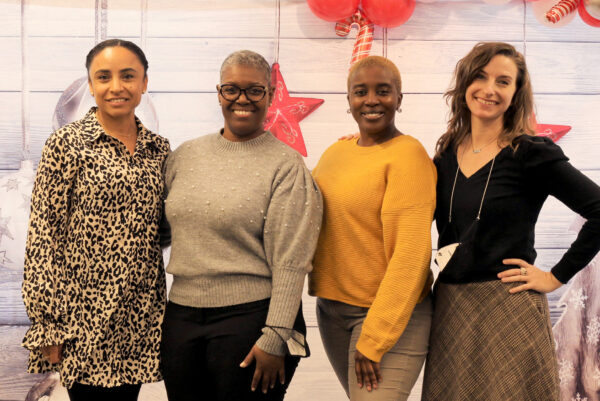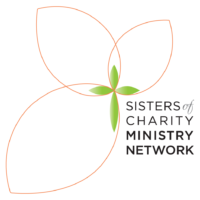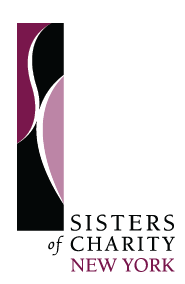Diversity, Equity & Inclusion (DEI) — Listening the Words into Life
by Regina Bechtle, SC
The following is from the Winter 2022 issue of VISION.
“We are called…to be women of healing, sensitive to the wounds of persons and to the systemic evils of our times.”
(Sisters of Charity Constitution, 1.4)
To heal the deep racial divisions so painfully evident in our society, each person and organization has work to do. Deep listening is a necessary part of that work, as shown by the ongoing efforts of The New York Foundling, a significant and noted SC-sponsored ministry.

In June 2020, a month after the killing of George Floyd in Minneapolis, Bill Baccaglini, CEO, convened a “town hall” gathering for the agency’s senior managers and employees. The meeting allowed everyone to express their feelings and voice concerns regarding this most recent incident that led to the death of an unarmed minority man. The conversation about the social injustices allowed the work force to talk about their own lived experiences.
(The Foundling, over 150 years old, is a multifaceted agency that provides a wide range of services to 30,000 children, adults and families in need at sites in every borough of New York City and Puerto Rico.)
Following that town hall, a series of open conversations led to The Foundling’s first Diversity, Equity and Inclusion Committee. This committee’s makeup was “as diverse as possible,” said Carmen Jirau-Rivera, Executive Vice President, who led the initial effort along with Co-chair Karen Reid, Vice President with the Developmental Disabilities Division. Over the first six months, Carmen, Karen and the committee members convened focus sessions with leaders of The Foundling’s various divisions and then with their staff members. The committee held weekly 90-minute sessions and invited feedback from everyone in the work force. Careful to ensure that no one was excluded, the committee wanted to hear from as many employees as possible, representing every ethnicity and race.
Deeply affected by the experience of listening, Carmen recalled, “My heart was racing” as she heard members of the work force speak about the “trauma they experienced … at this time of the height of social unrest, … the fear … as they tried to protect family members, the trauma they were dealing with every day while going about their business….” During the next phase, this DEI committee of seven employees summarized the information collected during the interviews; this was shared with The Foundling’s Senior Cabinet and its Board.
The Committee embarked on an Extended Learning Experience focused on educating the work force on the experiences of others and expanding their awareness and encouraging support for diversity, equity, and inclusion in its service practices. A professional consultant worked with the committee as needed and helped them to identify issues affecting their work force and to make recommendations for change. The result: a 14-member Diversity, Equity & Inclusion (DEI) Advisory Council.
The DEI Advisory Council’s work has been guided by three mandates initially laid out by CEO Bill Baccaglini:
- ensure that every employee/person served by The Foundling has a voice and a sense of ownership in the process;
- make sure that the importance of DEI is embedded in recruitment, hiring, training and extended career development;
- assess and improve professional development practices to give everyone the opportunity for a career path.
Interviewed in May 2021 about her ongoing experience, Karen reflected, “We spend a lot of time listening. [That’s] important for change to happen.” Deep listening can bring its own pain, she noted; “I experience some of the trauma as I hear about someone else’s.” In listening sessions after the killings of George Floyd and others, she had colleagues say to her, “We never knew that this is how this affects you.”
As with any major change—whether in one person’s thinking and acting, an organization’s culture and practices or a society’s structure—time must be spent laying a solid groundwork. Carmen and Karen acknowledged that they and their colleagues in The Foundling’s DEI effort “have learned as a group,” even as they recognize that their work force is anxious to see changes.
Asked how they would define “success,” Karen replied that it would be marked by “systems … in place that are fair and equitable for everyone, no matter the race.” She added, “It will take all of us to participate to make this needed change happen.” Carmen noted the “evolving” nature of the process. Success, she said, will be “when the agency gets to the position that change is ongoing to us, [when we] continue to listen to what staff and those we serve are saying to us.”
In the Advisory Council’s second year of implementation, it is focused on listening and learning from those served in the organization. This will enable the NYF to incorporate its voice in the advocacy processes and continue to advance recommendations for equity and consistency in employment and professional development practices with the work force. They also continue to plan for and support the Extended Learning Experience for the entire work force.
(With special thanks to Carmen Jirau- Rivera and Karen Reid.)
Support of the Ministry Network

During their annual meeting in June 2021, the Board of the Sisters of Charity Ministry Network passed the following resolutions in support of DEI initiatives by their member organizations and administrators.
Sr. Karen Helfenstein, Director of Sponsorship Services, said “We’ve come far, and we have a responsibility to reflect diversity.”
RESOLUTIONS OF THE SISTERS OF CHARITY MINISTRY NETWORK
The Board of Directors of the Sisters of Charity Ministry Network… do hereby adopt the following resolutions:
WHEREAS every human being is created in God’s image and
WHEREAS this fundamental belief has animated the Sisters of Charity ministries through their history and
WHEREAS sadly, persistent, even increasing instances of exclusion, inequality and systemic injustice wound humanity and bring expanding challenges in the work of the ministries to bring healing and restore right relationships,
BE IT RESOLVED, that we stand united with our Ministries in eradicating all forms of racism and inequality; and be it further
RESOLVED, that we commend our Ministries in their call to end systemic racism and inequity in our communities by focusing on diversity, equity and inclusion in their provision of services to those most in need; and be it further
RESOLVED, that we support our Ministries in their quest to bring about changes to ensure that there is justice, equity and inclusion in our communities.
June 23, 2021
Sr. Donna Dodge
President
Chair, Ministry Network Board
